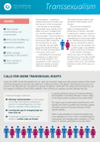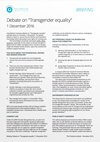The Government has committed to revising the Gender Recognition Act to further accommodate transsexualism, despite a notable lack of support from MPs.
Dismissing public safety concerns, Govt Minister Caroline Dinenage welcomed several recommendations in a backbench debate yesterday. It featured fewer than two-dozen MPs.
Leading the debate, the Chairman of the Women and Equalities Committee, Maria Miller MP, called for “self-declaration” of gender and a new “protected characteristic of gender identity” in law.
Exaggeration
Miller claimed that more than 650,000 people in the UK can “identify with being trans”, but since the Gender Recognition Act was passed, fewer than 4,500 people have legally changed their sex.
Miller’s pro-trans agenda was challenged by Labour MP Caroline Flint, who said we should “be wary of creating gender-neutral environments that may prove more of a risk to women”.
She cited a recent incident in a gender neutral toilet at the University of East Anglia, where it was “revealed that a man had been using those facilities to harass women”.
“How does the Right Honourable lady think we can protect women from male violence in gender-neutral environments?” she asked.
Easy access
However, several MPs, mainly from the SNP, called for changes to the current law, to make it easier to ‘change sex’.
Labour MP Lyn Brown said the Government should consider giving people immediate access to harmful sex-change surgery, using a system of informed consent. Currently, there are more stringent mechanisms in place before access to the procedure is granted.
Conservative MP Ben Howlett called for legal recognition for “young people whose gender identity is less well developed than that of an adult”.
SNP MPs Hannah Bardell and Kirsten Oswald also spoke, with Bardell saying that people should not have to identify their gender or marital status on forms, simply stating ‘Mx’ before their name.
Govt review
At the end of the debate, Caroline Dinenage, the Government’s Parliamentary Under Secretary of State for Women, Equalities and Early Years, revealed that the Government is publishing guidance on gender-neutral toilets and how to survey transsexual staff. She also committed to looking at evidence on “self-declaration” of gender.
Dinenage concluded by challenging an accusation that the Government has “not gone far enough or fast enough on trans equality”, saying “we are the Government who introduced same-sex marriage, a defining milestone in equality.
“We will achieve the same milestone for our trans community by revising the Gender Recognition Act, and through other major initiatives”.
Transsexualism – wanting to change physical sex because you feel you are ‘in the wrong body’ – has become an increasingly high-profile issue. People in the public eye have ‘changed their sex’, and the media normalises transsexualism. There has been a corresponding push for greater transsexual rights. This briefing introduces some of the issues at stake.
’Scientifically illiterate’
The debate was sparked by a Women and Equalities Committee report, released at the start of this year.
It called for a move towards “self-declaration” of gender, an ‘X’ option for passports and 16 and 17-year-olds to be allowed to apply for gender recognition.
In January, the Institute’s Deputy Director for Public Affairs, Simon Calvert, wrote a comment piece calling the report “morally and scientifically illiterate”.
‘Cruel’
He said it is cruel to make transsexual people “believe that surgery, or ‘non-gendering’ of official records, will solve all their problems.
“It won’t. This is borne out by the tragically high suicide rate for people who have had a sex-change operation”.
Mr Calvert added: “Transsexual people need patient help to come to terms with reality. The law must stop forcing people to lie about other people’s gender.”
Find out more
The Institute produced a briefing on transsexualism ahead of the debate. You can read it below.
A backbench business debate on “Transgender equality” took place on Thursday, 1 December 2016. The debate followed a report in January 2016 by the Women and Equalities Committee which demanded more rights for transsexuals.



